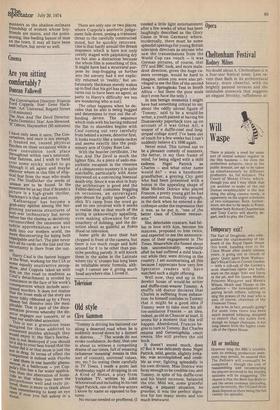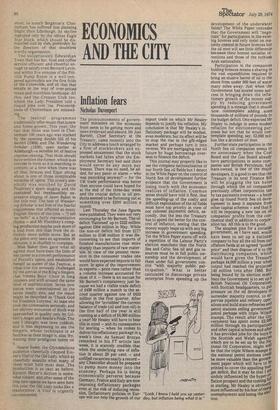Opera
Cheltenham Festival
Rodney Milnes
No doubt about it, Cheltenham is is a four-star festival town. Less severe than Bath in its architectural beauty, more cheerful, with its brightly painted terraces and the inimitable ironwork that suggests an elegant frivolity, raffishness al
most, to match Brighton's. Cheltenham has suffered less planning blight than Edinburgh. its skyline ruptured only by the odious Eagle Star block, which should be dismantled slab by slab, preferably by the directors of that doubtless worthy organisation.
The voluptuously Edwardian Town Hall has bar, food and coffee service efficient and cheerful enough to satisfy even Bernard Levin, and within five minutes of the Pittville Pump Room in a well-tempered automobile are the first folds of the Cotswolds, and all that that entails in the way of over-priced' meals and matchless landscape. All this, and the Croquet Club too, where the Lady President told a risque joke over tea, Preconceptions of Cheltenham are misleading.
The festival programmes traditionally offer music that is new and home-grown.. This year, the fact that Hoist was born in Cheltenham 100 years ago was marked by the opening double bill of his Savitri (1908) and The Wandering Scholar (1930), seen earlier at Aldeburgh—a sensible bit of festive expense-sharing. That Hoist should have written the former, which is as concise in form as it is searching in content, at a time when there was all that Strauss and Elgar sitting about is one of those inexplicable miracles of opera. The score's simplicity was matched by David Pountnev's spare staging and the contained but inexhaustibly expressive singing of Janet Baker in the title role. The text of Wandering Scholar is not free of the fearful roguishness that afflicted so many English libretti Of the time — "I tell 'ft/belly" is a fairly representative rhyme — and Mr Pountney's romping production maybe took more of a lead from this than from the infinitely more subtle score. But as the piece only lasts an agreeable 20 minutes, it is churlish to complain.
Miss Baker then gave what all agreed must have been the Dido of her career in a concert performance of Purcell's opera, and established herself as queen of the Festival, a royal title not seriously challenged by the arrival of the King's Singers, that Vienna Boys' Choir in long trousers and with around the same level of sophistication. Seven new pieces were commissioned on the seven deadly sins, and the result might be described as 'Thank God for Elisabeth Lutyens.' At least she took the commission seriously, and her slithery evocation of Sloth was approached in quality only by Gilbert's Anger and Searle's Pride. The rest I thought was twee rubbish, and it was depressing to see the Singers, whose technique is as faultless as their image is, alas, fey, wasting their prodigious talent on it.
Nearer home, the Glyndebobrne audience cheerfully clapped Einem's Visit of the Old Lady, which as cheerfully assaults what many of them must hold most dear. The production is as taut as before, Kerstin Meyer's diction is some what clearer, and after some of the limp new operas we have seen here this year, the Old Lady looks like a masterpiece. A Visit is urgently recommended.



































 Previous page
Previous page